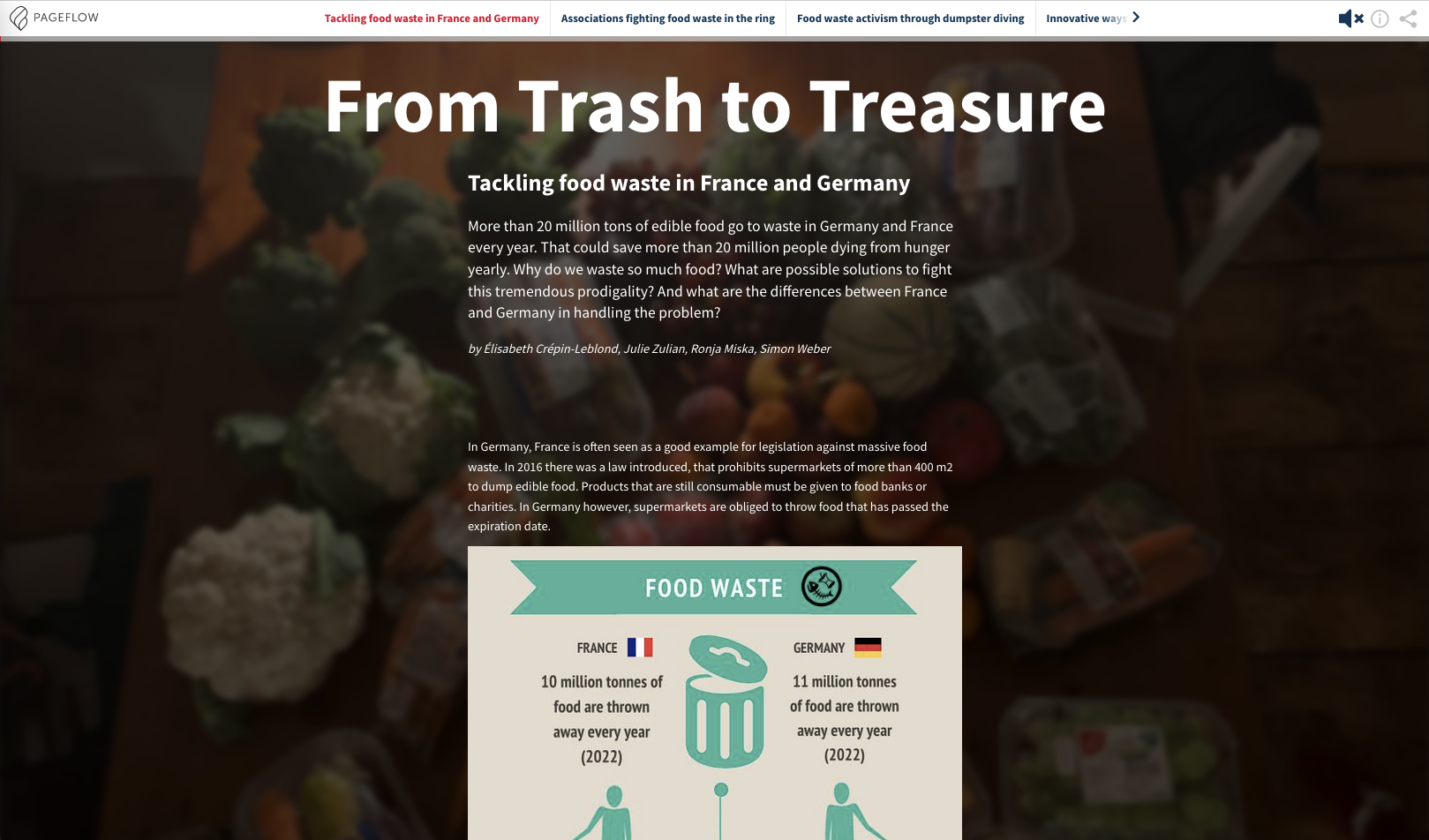More than 20 million tons of edible food go to waste in Germany and France every year. That could save more than 20 million people dying from hunger yearly. Why do we waste so much food? What are possible solutions to fight this tremendous prodigality? And what are the differences between France and Germany in handling the problem?
Élisabeth Crépin-Leblond, Ronja Miska, Simon Weber and Julie Zulian have put their reporting in a multimedia storytelling you can visit here:
https://frenchgermanfoodwaste.pageflow.io/from-trash-to-treasure
In Germany, France is often seen as a good example for legislation against massive food waste. In 2016 there was a law introduced, that prohibits supermarkets of more than 400 m2 to dump edible food. Products that are still consumable must be given to food banks or charities. In Germany however, supermarkets are obliged to throw food that has passed the expiration date.
Comparing the amount of wasted food per person, France wastes slightly more than Germany. While in France about 150 kg per person and year end up in waste containers, in Germany the number is about 137 kg per person. Both countries have a great need to improve. But even more important than comparing numbers and ranking lists, is the exchange of ideas and possible solutions. In France as in Germany, there are numerous initiatives and organizations trying to tackle the problem of food waste. We would like to introduce a few of them today.
Associations fighting food waste in the ring
In France, the association Linkee collects unsold goods from supermarkets, grocery stores, and bakeries. The goal is to redistribute them. This makes it possible to provide meals to people with food insecurity. As a sign of the precariousness of student life in France, many young people are regulars. We met with Linkee volunteers to learn more about their fight against food waste and food insecurity.
If you want to find a lot of volunteers fighting against food waste in Germany, you should look out for Foodsharing and its 200.000 members. The initiative creates cooperations with supermarkets, local food markets, bakeries, etc. to pick up leftover products that are unsold.
Food waste activism through dumpster diving
Linkee and Foodsharing are comparable initiatives in France and Germany. They act completely legally. This is not always usual in the context of rescuing food. Especially in Germany, the topic is often associated with crime. Sounds strange, but it is what it is. “Dumpster Diving” is the act of rescuing food from trash containers belonging to supermarkets. Taking trash without permission is considered thievery under the law. It is hard to say, how many “dumpster divers” exist in Germany and France. However, in Germany, dumpster diving is quite common, in particular among young, eco-friendly people.
In France, dumpster diving is less common. Firstly, the Food Waste Act was passed in 2016. Secondly, there are other schemes such as Too Good to Go or Linkee. This limits the amount of waste in the bins, although this still varies from area to area. The other reason is the difficulty of accessing the bins: some are inaccessible because of bars, cameras or padlocks. A 21-year-old French student, Mathilde, has been practicing dumpster diving for several years with friends :
Our motivations were anti-industrial, anti-consumerism, and anti-waste linked to this over-industrialization. It’s both a militant act against waste and also good for our wallets, especially when we’re young.
Mathilde and her group of friends went to the supermarkets after closing time. In the dozens of garbage cans per supermarket, « we find everything, apart from cans generally sold before their expiration date. It could be cakes from the bakery section, milk, chocolate, fruits, etc. There are always plenty of surprises, and the quantities are enormous« , explains the student, The recovered foodstuffs are all protected by their packaging. « The only problem in terms of hygiene is that the cold chain can be broken because we have to go at night when all the company’s employees have left« , notes Mathilde.
It’s a lot less accessible than it used to be.
But the practice is not without risk. Dumpers are careful to avoid the surveillance cameras installed to track them. While rummaging through garbage cans is not illegal in France, the practice displeases supermarkets. They don’t hesitate to install barriers or barbed wire to block access to their waste. « It’s a lot less accessible than it used to be« , Mathilde laments. There’s another reason why she stopped doing it. « I don’t do it anymore because I live in Paris. Generally, you do this kind of thing in the countryside with a car. It’s simpler, and you can leave quietly« , explains the student.
In addition to securing the garbage cans, dumpster diving faces another difficulty. « Apps like To Good To Go mean that there are fewer things in the garbage cans, especially fruit, and vegetables, » reports Mathilde, who nevertheless assures us that the practice remains widespread « in degrowths circles like the ones I used to frequent. It’s increasingly complicated« , she sums up, « sometimes you have to go through the roof, but it’s cool, it’s an adventure !« .
Innovative ways to combat food waste
Raphael Fellmer himself, founder of SirPlus, has been a dumpster diver for many years. But he didn’t only want to rescue food on his own: To end the tremendous waste of food, it needs way more than some committed individuals rescuing leftovers. That’s why first, Raphael founded the food sharing-network which has over 60.000 supporters today.
During his food sharing operations, Raphael saw hundreds of entire pallets of food assigned to waste. The number of unsellable products was too big for food-sharing volunteers. The food was enough to fill up whole supermarket shelves. So that’s exactly what Raphael and his co-founder Martin did. In 2017, they created Sirplus, a supermarket that resells surplus products and while doing so, brings them back to the supply chain.
The supermarket sells its products online. You can buy a wide range of food, cosmetics, household goods, snacks, fruits, and vegetables… You either pick exactly what you would like to buy, or you choose a subscription box that directly arrives – either a single time or regularly – at your home. The startup facilitates access to saved food for everyone. “Making Food rescue mainstream” is the goal. Sirplus has rescued more than 2.500 tons of food so far. That’s the equivalent of 140 trucks of food.
The products are rescued either from the producers, from logisticians, or from big central warehouses of supermarkets such as Edeka and METRO. Most products are either about to pass or have passed the expiration date. But Sirplus also rescues food, that has an outdated design, packaging defects, or fruits and vegetables that just don’t fit in beauty norms. The prices vary depending on the products and their condition, but you can get most of the goods for about half of the original price. No more dumpster diving is needed, all legal and even cheap!
In France, artificial intelligence saves unsold goods
In terms of supermarkets, how can we ensure that all expiration dates are controlled? So that they can be resold or donated to charity? To save staff time, Smartway in France has decided to use artificial intelligence to recover these products. It locates all expired products and suggests either a discount or a donation to charity. It also facilitates labeling, saving time and increasing efficiency.
Launched in 2012 under the name “Zéro Gâchis”, the company offered special shelves to display discounted products for quick consumption. Today, the company has turned to artificial intelligence to combat waste in supermarkets. The goal is to have 0% wasted products in its stores by 2032.
Will there be an EU law ? The fight of Arash Derambarsh
There is a wide range of initiatives, organizations, startups, and innovations that offer possible solutions to food waste. However, Germany and France are two countries that continue to experience high levels of food waste. For cultural reasons, each country wastes, but also fights in its own way. To harmonize the fight, legislation could enable European countries to reduce food waste and food insecurity. This is what Arash Derambarsh is fighting for.
The need for a European law
On 5 July 2023, the European Commission proposed to the 27 Member States to reduce food waste from shops, restaurants, and households in the European Union by 30% within seven years, compared to 2020 levels. But, for Arash Derambarsh, this proposal is far from the French law that he would like to see applied across the EU: « It’s not serious. Hungry people aren’t going to wait until 2030. The objective is now, the French law must be applied throughout the European Union, it’s very simple. »
Hungry people aren’t going to wait until 2030.
Since 2016, several European countries have passed the French law to reduce food waste, such as Romania, Italy, and Finland. Arash Derambarsh believes that European law will make it possible to use the right tools to take sustainable action in this fight. The lawyer highlights the cultural differences between countries, each of which has its way of combating food waste: « Behaviours are not the same, so the solutions are not the same. That’s why we need harmonization. There needs to be synchronization because European citizens need to have the same regulations. »
Going further
The lawyer also works at a local level. In the town of Courbevoie, the deputy mayor wants to introduce one charter a year, covering all areas. The first year concerned supermarkets, the second: hospital catering, then school catering, and this year, markets. What about next year? It’ll be nursing homes. As well as campaigning for European law and national initiatives, the lawyer intends to put in place all the tools needed to ensure that the fight is waged at every level.
There’s no reason to wait seven years.
Since 2016, Arash Derambarsh has pointed out that the French law has saved more than 10 million meals a year and led to an increase of more than 22% in food donations to social aid organizations. In his view, this is proof that a European initiative is needed: « There’s no reason to wait seven years. It’s been eight years now that we’ve seen on the ground that it works. And at a time when there is so much poverty, there are no small initiatives. »
Food waste is a global problem and it therefore needs to be tackled on a supranational level. Legislative initiative is one face, on the other hand we can benefit from the variety of local and national projects that already exists. The initiatives presented in this article are only some examples of ideas against food waste. They can inspire and sometimes be adopted in other countries as well.
_____________________________________________________________
This multimedia storytelling is a product of the project „Futur2 – French German Journalism“ by students of BA Journalism, KU Eichstätt-Ingolstadt and M1 Journalism, CELSA Sorbonne University. It was funded by Deutsch-Französische Hochschule | Université franco-allemande: „Élysée-Vertrag – Zusammen den Blick in die Zukunft richten“ in 2023.



